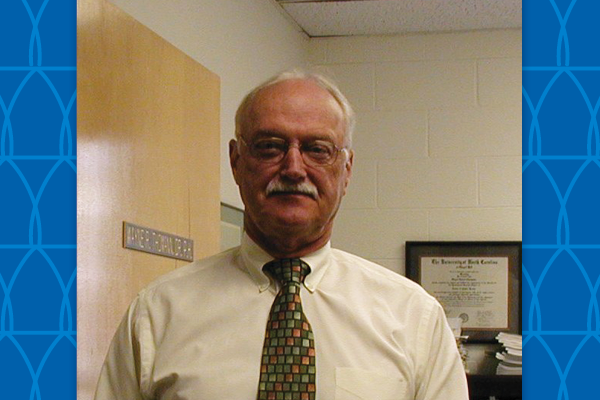
Wayne Thomann, DrPH, started out studying microbiology, but realized something was missing. “I liked microbiology, but I didn’t necessarily like just cranking in the lab,” he said. “I liked working with people.”
At Duke, Thomann found the perfect place to combine his love of science, his interest in microbes and other potential hazards, and his desire to work with people. He recently retired from a 41-year career as the director of the Duke Occupational and Environmental Safety Office (OESO) — a role he calls “about as perfect a fit as you can get.”
One of his biggest accomplishments at Duke was developing a comprehensive safety program for both the health system and the university, each of which previously had their own programs for fire, radiation, and other safety issues. He also expanded the safety focus to include a wider array of concerns, from ergonomics to mold remediation and everything in between.
“He created something from nothing,” said Matthew Stiegel, PhD, who succeeded Thomann as the director of the OESO. “He created an office of 60-plus people that service both the health system and university employees — more than 44,000 people.”
Thomann became interested in occupational health and safety after earning a master’s in microbiology. He worked in a hospital in Boca Raton, Florida, where some of his duties included infection control in a lab that dealt with infectious agents. “I had the responsibility that my employees didn’t get infections,” he said, “and I really enjoyed that.”
To pursue his growing interest, he came to UNC-Chapel Hill to earn a doctorate in public health with an emphasis on biohazard science. In 1982, he completed his studies and was hired at Duke. He was initially in charge of both infection control and environmental safety in the hospital and medical center and was appointed to the faculty in the Department of Family Medicine and Community Health. He was also tasked with creating a campus-wide employee safety program.
In 1992, he handed over infection control at the hospital to the Division of Infectious Diseases so that he and the OESO could focus more fully on growing and maintaining the comprehensive safety program, which encompassed the university, the medical center and all its hospitals and clinics, and even the Marine Lab in Beaufort.
In addition to running the OESO, Thomann taught graduate courses on occupational and environmental health and safety at the Nicholas School and conducted research with graduate students from both Duke and UNC, including his future colleague and eventual boss, Matthew Stiegel. “The research we did helped us do our jobs better because we developed new technologies or capacities to manage safety at Duke,” Thomann said.
Thomann has made an impact on workplace safety well beyond Duke. “His area of great expertise is indoor air quality,” said Carol Epling, MD, executive director of Employee Occupational Health and Wellness. “He made a name for himself in the nation as the go-to expert in that area.” He has participated for decades on committees for the American Society of Heating, Refrigerating, and Air Conditioning Engineers (ASHRAE), which creates national and international standards for ventilating buildings for clean air.
He also was on the authorship team of two widely used books: “Prudent Practices in the Laboratory: Handling and Disposal of Chemicals” and “Occupational Health and Safety in the Care and Use of Research Animals.” And for 30 years, he served on the North Carolina Radiation Protection Commission, for which he received the Order of the Long Leaf Pine award from the governor in 2017.
In almost everything Thomann did, he got his wish to work with people, including researchers, lab techs, physicians, administrators, students, and others. “My biggest joy at Duke was having leadership roles and working with really exceptional leaders and employees,” he said.
Stiegel said Thomann always found time to counsel others despite his myriad responsibilities. “If his door was open, you could stop in and talk to him at any moment,” Stiegel said.
Stiegel especially appreciated Thomann’s accessibility during COVID, which showed up in the United States just as Thomann was handing over the reins of the OESO to Stiegel. “He was always available to help, even if it was midnight or 2 a.m. or 4 a.m.,” Stiegel said. “We had many, many late nights going through risk analyses or communications or lab-based procedures.” Among other things, Thomann helped with the process of Duke receiving emergency use authorization from the Food and Drug Administration to decontaminate N95 respirators for health workers, ensuring that providers and staff had appropriate protection during the early days of the pandemic when masks were in short supply.
Now that Thomann has retired, effective February 2023, he is spending more time with his wife and four adult children, more time at his lake house, and more time golfing – partly as a result of peer pressure. “I’m golfing again after many years of smarter decision-making,” he joked. “Some of my best friends do it.”
But he still plans to continue some of his professional activities, including his work with ASHRAE. “I’m not one of those guys who has hung up my lab coat and I’m done,” he said.
He is currently the vice chair of ASHRAE’s Ventilation for Acceptable Indoor Air Quality committee, where he enjoys digging into questions of how and when to increase filtration of indoor air in response to wildfires or raging respiratory viruses and how to balance the need for filtration and the extra energy it takes to provide it. “That stuff is fun,” he said. “That’s why I’m sticking around. I won’t give it up because it’s so challenging and interesting.”